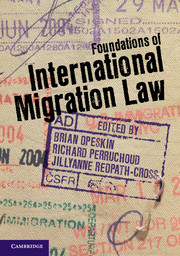Book contents
- Frontmatter
- Summary contents
- Detailed contents
- Preface
- List of case studies
- List of boxes
- List of figures
- List of maps
- List of tables
- Notes on contributors
- Abbreviations
- 1 Conceptualising international migration law
- 2 Contemporary patterns of international migration
- 3 Sources of international migration law
- 4 Nationality and statelessness
- 5 State sovereignty and freedom of movement
- 6 International human rights of migrants
- 7 Refugees and asylum
- 8 Women, children and other marginalised migrant groups
- 9 Human trafficking and smuggling
- 10 International migration by sea and air
- 11 International labour migration
- 12 International trade law and labour mobility
- 13 Global migration institutions and processes
- 14 Regional processes, law and institutional developments on migration
- 15 Emerging legal issues in international migration
- Appendix 1 Cases
- Appendix 2 Treaties and other international instruments
- Glossary
- Index
- References
14 - Regional processes, law and institutional developments on migration
Published online by Cambridge University Press: 05 November 2012
- Frontmatter
- Summary contents
- Detailed contents
- Preface
- List of case studies
- List of boxes
- List of figures
- List of maps
- List of tables
- Notes on contributors
- Abbreviations
- 1 Conceptualising international migration law
- 2 Contemporary patterns of international migration
- 3 Sources of international migration law
- 4 Nationality and statelessness
- 5 State sovereignty and freedom of movement
- 6 International human rights of migrants
- 7 Refugees and asylum
- 8 Women, children and other marginalised migrant groups
- 9 Human trafficking and smuggling
- 10 International migration by sea and air
- 11 International labour migration
- 12 International trade law and labour mobility
- 13 Global migration institutions and processes
- 14 Regional processes, law and institutional developments on migration
- 15 Emerging legal issues in international migration
- Appendix 1 Cases
- Appendix 2 Treaties and other international instruments
- Glossary
- Index
- References
Summary
INTRODUCTION
The preceding chapters have examined various facets of international migration law at the universal level, as well as developments in the governance of migration in the global context. In parallel, legal frameworks and ‘softer’ governance arrangements and policy processes on migration gained prominence at the regional level in many parts of the world. Globalisation and regionalisation trends have been proceeding hand in hand for decades and are particularly evident in regional economic and political integration processes, which build on geographical proximity and historical affinity. Furthermore, there is a strong regional rationale for migration governance: driven by historical, linguistic, cultural and economic ties, most international migration takes place at a regional level among neighbouring States. For instance, approximately two-thirds of migrants from sub-Saharan Africa have moved within the region, and the same is true for 43 per cent of Asian migrants. Likewise, most European Union nationals who live outside the State of their birth are in another State of the European Union, and the vast majority of migration in the Americas is intra-regional. The picture is very similar in other regions of the world (see Chapter 2).
These migration realities, as well as broader geopolitical shifts towards greater regional and global cooperation on a range of issues, have created a natural impetus for developments in migration law and governance at the regional level, which will be examined in this chapter. Section 14.2 explores the growing role of regional institutions – principally political and economic associations and integration processes – in migration governance. Section 14.3 reviews developments in regional consultative processes on migration, which are non-binding collaborative arrangements among States, dedicated solely to migration issues. They emerged in the 1980s and now exist in all major regions of the world. This section also examines a relatively new form of collaboration known as inter-regional fora. Section 14.4 focusses on elements of regional law of particular relevance to migrants, taking as examples nationality and statelessness, the entry and exit of non-nationals, and some aspects of forced migration, to illustrate the potential inherent in regional legal instruments and their contribution to international migration law. The chapter concludes with observations about the future impact and interaction of these processes in the complex global fabric of migration law and governance.
- Type
- Chapter
- Information
- Foundations of International Migration Law , pp. 366 - 389Publisher: Cambridge University PressPrint publication year: 2012
References
- 1
- Cited by



